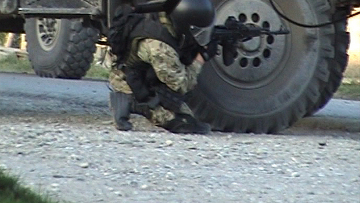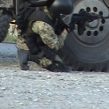
Police Violence in Dagestan Continues as Republic Drifts Toward Collapse From Within
Publication: Eurasia Daily Monitor Volume: 11 Issue: 91
By:

On May 5, Russian President Vladimir Putin signed a decree abolishing the Ministry of Interior main directorates in all of Russia’s federal districts except for the North Caucasus Federal District (https://www.regnum.ru/news/kavkaz/dagestan/1798913.html).
By retaining the special police structure in the North Caucasus, Putin recognizes that the situation in the region forces him to make exceptions and seek ways to prevent the escalation of violence in this part of the country. It should be noted, however, that the Interior Ministry Main Directorate has only oversight responsibilities over a variety of local structures. The directorate has no independent power, and the republican authorities try to solve their problems by dealing directly with Moscow. Still, this government office apparently makes itself useful by maintaining a database of Salafis in the region. This came to the forefront when a massive crackdown on Salafis was carried out in Khasavyurt on May 7–8 (https://www.kavkaz-uzel.ru/articles/242306/).
The Main Directorate of the Ministry of Interior in the North Caucasus also gives local residents a place to file complaints about police abuses. There is always something to complain about in the North Caucasus, and this is especially true today in Dagestan.
Counter-terrorist operations, murders, kidnappings, bombings and shootouts have become routine in Dagestan. Almost on a daily basis, the Russian security services conduct operations against armed jihadists that are rarely reported by the national media in Russia. Still, losses among government forces continue to draw the attention of the Russian media. Thus, on the night of May 9, unidentified assailants killed an officer from the Russian Federal Security Service (FSB) in Makhachkala. The attackers fired at the officer’s SUV when the car was driving through the intersection of Yaragsky and Yermoshkin streets (https://www.regnum.ru/news/kavkaz/dagestan/1799983). The slain officer turned out to be a major in the Dagestani branch of the FSB. Preliminary reports said the attackers drove a Russian-made car (https://dagestan.kavkaz-uzel.ru/articles/242297/).
It should be noted that the attack took place several hours after the end of another counter-terrorist operation in in the notorious town of Semender in Makhachkala’s Kirov district, where a house in which a group of militants was hiding had been sealed off by the police and FSB forces since May 7. The confrontation concluded with four suspected militants being killed. The National Antiterrorist Committee (NAK) claimed all four were members of the Makhachkala militant group (https://www.riadagestan.ru/news/security/rezhim_kto_zakryli_v_makhachkale/). Thus, the subsequent killing of an FSB officer may have been the insurgents’ response to the FSB’s actions in Semender. According to independent monitoring of the situation in Dagestan, eight officers have been killed and 39 injured in the republic since the start of 2014. In the first quarter of 2014, six officers were killed and 34 injured (https://dagestan.kavkaz-uzel.ru/articles/242297/).
Few Russians, however, are interested in the rising number of kidnappings by government forces in Dagestan. Kidnappings are a way of putting pressure on the relatives of the militants or on their sympathizers—or, more generally, on Salafis. At the end of April, a group of armed people from an unidentified government agency arrested Arif Mamaliev and Zakir Magomedkerimov, residents of Derbent. Relatives of these individuals asked the police to find them, but the authorities refused to look for the two detainees. Several days later, the body of Arif Mamaliev was found at the scene of a special operation (https://kavkazcenter.com/russ/content/2014/04/27/104286.shtml). The government has not provided an explanation for how a person detained and questioned at the Center for Combatting Extremism in Makhachkala and threatened with a four-year prison sentence turned up dead at the site of a counter-terrorist operation in Derbent a day after being interrogated (https://dagestan.kavkaz-uzel.ru/articles/241729/).
The government policy of denial prompts relatives of detained Salafis to rush to locate the place of their detention and follow their transfers. People remain at the entrances of government buildings around the clock in order to prevent a tragedy like the one that happened to Arif Mamaliev after he was arrested in Derbent. However, more often than not, relatives of the detained fail to find out where their kin are being held, as happened in the case of Feliks Agaragimov, the imam of the village of Kurkent in Dagestan’s Suleiman-Stalsky district, whose relatives could not find him for an entire week. The district police denied they had arrested the 31-year-old Agaragimov, while his relatives said he had been arrested after his home in Kurkent was searched on May 6 (https://dagestan.kavkaz-uzel.ru/articles/242339/). The authorities remained completely unruffled despite the fact the cleric was detained after a meticulous search in his home. Finally, several days later, the Dagestani police admitted they had detained Agaragimov, so a tragic sequence of events was prevented in his case.
In another case, relatives of Gajimurad Ibragimov have been unable to locate him since he left the Dagestani city of Kizlyar on May 8 with several friends, who are also missing (https://dagestan.kavkaz-uzel.ru/articles/242346/).
Blowing up the houses of members of the armed resistance and their relatives has also become routine police practice. Most recently, on May 4, the house of a militant killed in a special operation a year earlier was blown up in the village of Agachaul in Dagestan’s Karabudakhkent district (https://www.youtube.com/watch?v=htAtsVKl78k&app=desktop).
Russian authorities remain convinced that terrorizing the population of Dagestan will bring peace to the republic as the volatile regions reels from the heavy-handed police tactics that are not winning hearts and minds. In reality, however, the crisis is deepening as the jihadists and their sympathizers increase in numbers, and the general population increasingly regards them as people who are fighting Russian policies in the region.




